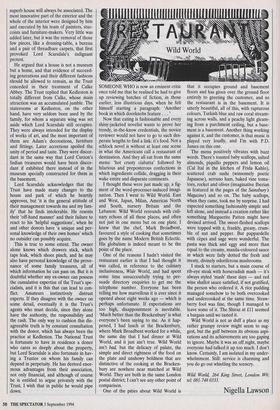Long life
Matters of trust
Nigel Nicolson
Two questions arise from the recent dis- pute between the National Trust and Lord Scarsdale, the previous owner of Kedleston Hall and now its 'resident donor'. The first is whether one should restore the interior of an historic house to its original appear- ance by removing objects of a later date that conflict with it. The second is the deli- cate relationship between the donor and the Trust.
Kedleston is not wholly the work of Robert Adam, but it is with him that this superb house will always be associated. The most innovative part of the exterior and the whole of the interior were designed by him and executed by his team of painters, stuc- coists and furniture-makers. Very little was added later, but it was the removal of those few pieces, like a dressing-table, a bureau and a pair of threadbare carpets, that first provoked Lord Scarsdale's indignant protest.
He argued that a house is not a museum but a home, and that evidence of succeed- ing generations and their different fashions should be allowed to remain, as the Trust conceded in their treatment of CaIke Abbey. The Trust replied that Kedleston is totally different from CaIke, whose main attraction was an accumulated jumble. The staterooms at Kedleston, on the other hand, have very seldom been used by the family, for whom a separate wing was set aside which Lord Scarsdale still occupies. They were always intended for the display of works of art, and the most important of them are Adam's decorations, furniture and fittings. Later accretions spoiled the unity of period and taste. They were discor- dant in the same way that Lord Curzon's Indian treasures would have been discor- dant if exhibited there instead of in the museum specially constructed for them in the basement.
Lord Scarsdale acknowledges that the Trust have made many changes to the house and park of which he heartily approves, but 'it is the general attitude of their management towards me and my fam- ily' that he finds intolerable. He resents their 'off-hand manner' and their failure to react to his 'helpful suggestions', when he and other donors have 'a unique and per- sonal knowledge of their own homes' which no outsider can possibly acquire.
This is true to some extent. The owner alone knows which drawers stick, which taps leak, which shoes pinch, and he may also have personal knowledge of the prove- nance of some family treasures, all of which information he can pass on. But it is doubtful whether any ex-owner can possess the cumulative expertise of the Trust's spe- cialists, and it is this that can lead to con- flict. Amateurs instinctively distrust experts. If they disagree with the owner on some detail, eventually it is the Trust's agents who must decide, since they alone have the authority, the responsibility and the cash. The only way to cushion this dis- agreeable truth is by constant consultation with the donor, which has always been the practice at Kedleston. The National Trust is fortunate to have in residence a donor who cares so deeply about the property, but Lord Scarsdale is also fortunate in hav- ing a Trustee on whom his family can depend in perpetuity. He has derived enor- mous advantages from their association, not only financial, and although of course he is entitled to argue privately with the Trust, I wish that in public he would pipe down.



























































 Previous page
Previous page